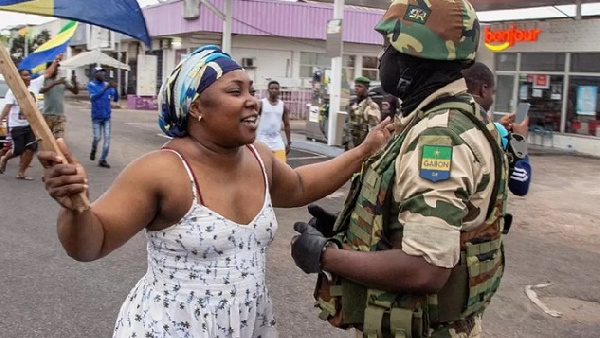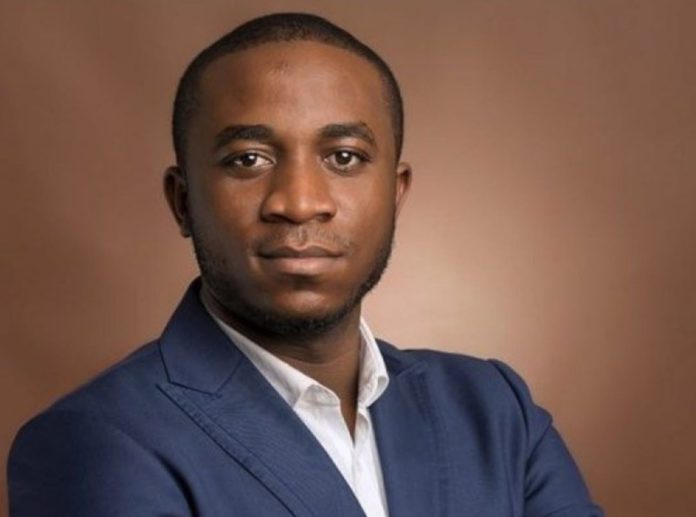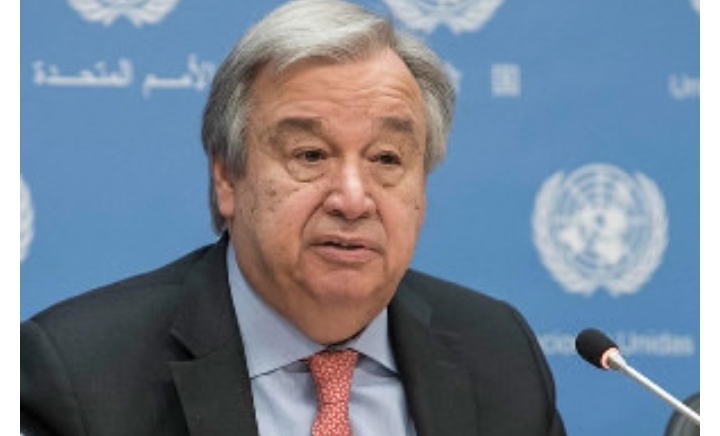Gabon coup: Why young Africans are celebrating military takeovers

A sudden statement on national television in the early hours of Wednesday, to declare Mr Bongo the winner of last Sunday’s election, was followed within minutes by a second surprise broadcast, as a clutch of soldiers announced the seizure of power in the former French colony.
Later in the day, as footage of celebrating crowds emerged – after the new junta had lifted the internet shutdown imposed by Mr Bongo’s regime on the eve of the polls and maintained the shutdown throughout an opaque vote “count” – the deposed head of state appeared in an online video sent from his place of confinement.
Looking bewildered, he appealed – in English – for friends outside to “make noise”, in apparent hope that external pressure might reverse the shock turn of events, a prospect that seems remote.
But even if Mr Bongo himself was caught unprepared by the coup, perhaps Africa and the world should not have been.
The 26 July overthrow of Mr Bazoum in Niger gave ample warning that West and Central Africa’s “coup-epidemic” had not run its course.
In January last year, it had been the turn of Burkina Faso’s President Roch Marc Christian Kaboré to be deposed by soldiers – whose leader was then himself dethroned by lower ranking counterparts on 30 September, just eight months later.
And before that, 2021 had brought two coups in West Africa. In May, Col Assimi Goïta, already author of a previous military takeover in Mali, had staged a second putsch to reassert his own power.
Then in September Guinea’s special forces fought their way into the Sékhoutouréyah palace in Conakry to take President Alpha Condé into custody.
And we should not forget Chad where, following the April 2021 death in battle of long-time strongman Idriss Déby Itno, a military council stepped in to ensure the succession of his son and, thus, the continuation of the regime.
What on earth is happening in West and Central Africa – and in former French colonies in particular?
Six years ago the departure into exile of the electorally-defeated Gambian ruler Yahya Jammeh left every country in West Africa under multi-party constitutional rule.
In the centre of the continent some authoritarian regimes survived, but the era of military takeovers seemed long past.
Yet the past three years have seen seven coups in five countries – plus the strong-armed military assumption of power in Chad.
There are common factors that have, at the very least, created conditions in which soldiers have felt they can step in with relative impunity, and often with the support of a large slice of the urban population, especially frustrated young people.
Across much of West and Central Africa, younger citizens have become widely disenchanted with the traditional political class, even with those who have been legitimately elected to office.
Such disillusionment is fuelled by a raft of issues – a shortage of jobs and even informal economic opportunities for both graduates and those less educated, perceived high levels of corruption and privilege among the elite, as well as resentment at the persistent influence of France in the many countries where it is the former colonial power.
But there is also deep resentment at the way many civilian rulers manipulate electoral processes or constitutional rule to prolong their hold on power. The scrapping of presidential term limits – after controversial amendments to constitutions – is a source of especially sore feelings.
And such abuses also undermine the moral authority of bodies such as the African Union – or the Economic Community of West African States (Ecowas), often labelled an “incumbent presidents’ club” – in seeking to force coup leaders to restore elected civilian rule.
The Central African regional bloc to which Gabon belongs does not even have serious pretentions to establish or sustain governance standards across member states.
But while all these factors create a climate in which soldiers have felt increasingly emboldened about seizing power, claiming to offer a “fresh start”, each coup has also been driven by specific national or narrow local motivations – and the takeover in Gabon is no exception.
Many Gabonese were sceptical about Mr Bongo’s decision to stand for a third term. He first came to power in elections 14 years ago following the death of his father, Omar Bongo, who had monopolised the presidency for more than 40 years.
There were also serious doubts about his capacity to provide effective leadership, as he had suffered from a stroke in October 2018.
The deposed president’s rule did see serious efforts to modernise the government machine, diversify the economy and tackle social inequality; and he earned international plaudits for proactive and innovative efforts to protect Gabon’s rainforests and rich biodiversity. There were some concessions to the political opposition.
But the reform momentum faded gradually, while the regime proved ultimately unwilling to expose itself to serious electoral challenge.
Indeed, from the outset Mr Bongo’s legitimacy and political standing was undermined by the opaque conduct of the election that brought him to power in 2009. Many people thought that André Mba Obame, his main electoral rival, had probably been the real winner.
And when he stood for re-election in 2016, in a tight race against former foreign minister Jean Ping, he only clinched a narrow victory when official results from Haut Ogooué region, the Bongo family’s political fiefdom, came in, recording an unbelievably huge number of votes for him. Yet the polling station records of these supposed votes were destroyed before they could be checked.
In the latest election, Mr Bongo was declared the winner with 64% of the vote. He did not allow any international observers to monitor the poll, and the opposition rejected the result as fraudulent.
The military finally stepped in, saying the election “did not meet the conditions for a transparent, credible and inclusive ballot so much hoped for by the people of Gabon”
Many Gabonese have welcomed the coup, but it does raise fears about the future of democracy in many countries in West and Central Africa.
Source: bbc.com





